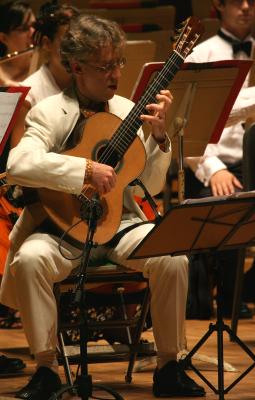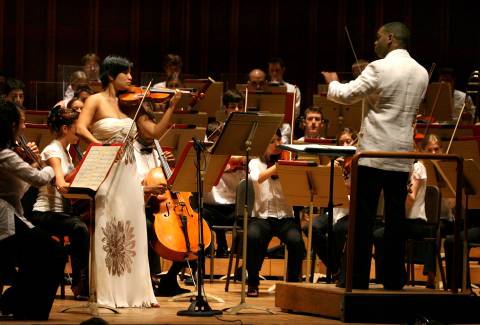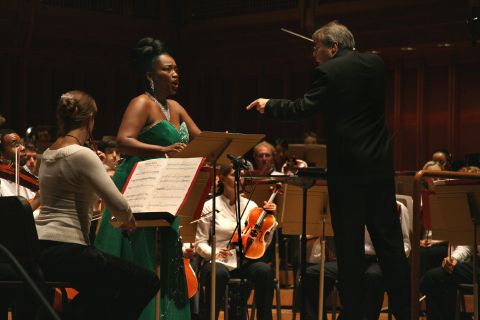|
<<< << -- 5 -- Lawrence Budmen A MILESTONE IN DANCE -- >> >>>

The outstanding piece on this program came from Pulitzer Prize winner Ellen Taaffe Zwilich. Her String Quartet No 2, composed for the Emerson String Quartet in 1998, is a poetic, emotional, lyrically expansive canvass that recalls the late quartets of Shostakovich. Zwilich's musical landscape is haunting in its theatrical passion and power. A poignant subtext permeates Zwilich's agitated string writing. The piece was given an intense performance by the New Fromm Players, a group of recent Tanglewood Music Center fellows who specialize in contemporary music -- violinists Yuki Numata and Martin Shultz (both members of Miami's New World Symphony), violist Nadia Sirota and cellist Lachezar Kostov. This group's silky tone and superb musicianship lit up the stage. Shultz was a powerful soloist in David Behrman's Protests 1917-2004. Set to thematic threads by Behrman's teacher Wallingford Riegger (who was blacklisted and persecuted during the infamous McCarthy era) the score accompanies a statement (made in 1917) protesting World War I by French poet and decorated war hero Siegfried Sassoon. Behrman's acerbic musical fragments form intense commentary to the moving text which still resonates in contemporary terms. Aperture, a new score by Jason Eckardt (not a member of the Generation of '38) that was commissioned by the Tanglewood Music Center, was mostly chaotic except for a bluesy central movement for solo flute, eloquently played by Sandy Hughes.

Eliot Fisk performs John Corigliano's 'Troubadours' (1993) during the Festival of Contemporary Music at Tanglewood. Photo © 2007 Hilary Scott
|
On 1 August the Tanglewood Music Center Orchestra, fresh from its triumphant Don Carlo performance, tackled an ambitious program of Generation of '38 orchestral scores at Ozawa Hall. John Corigliano's Troubadours (Variations for Guitar and Chamber Orchestra), composed for Sharon Isbin in 1993, is one of this composer's most atmospheric works. Spare, misty orchestration evokes a confluence of French and Spanish influences, ancient and modern. Elegant guitar strophes contrast with antiphonal effects from brass and percussion. Drawing on a contemporary neo-Renaissance style fused with impressionistic colors, Corigliano has concocted a winning piece that charms and delights. Eliot Fisk was sensitive, poetic and incisive in the virtuoso solo guitar writing. Tanglewood conducting fellow Erik Nielsen was attentive to the score's subtle nuances and shifting dynamics. The TMC Orchestra excelled in these contemporary scores, offering brilliant playing and vivid instrumental timbres.

Yuki Numata and the Tanglewood Music Center Orchestra conducted by Kazem Abdullah play Charles Wuorinen's Rhapsody for Violin and Orchestra, on 1 August 2007. Photo © 2007 Hilary Scott
|
Charles Wuorinen is an unrepentant atonalist. He is capable of writing powerfully communicative music but his Rhapsody for Violin and Orchestra (1985) is a loud, coarse, incoherent score. The tremendously difficult solo violin part was essayed by Yuki Numata with superb bravura technique, remarkable precision and eloquent artistry. Gifted conducting fellow Kazem Abdullah managed to bring clarity to the score's clangorous instrumental chaos. Strike Zones, Percussion Concerto (2001) by Joan Tower is a tour de force, replete with percussive colors (particularly from mallet instruments) and complex rhythmic interaction between soloist and ensemble. Navigating a large battery of percussion, Nicholas Tolle was simply terrific, bringing a sense of rhythmic variety and elegance to usually harsh sounding instruments. TMC conducting fellow Sean Newhouse provided an insistent, intelligently conceived orchestral performance.

Christin-Marie Hill and the Tanglewood Music Center Orchestra conducted by Stefan Asbury perform William Bolcom's 'Whitman Triptych' on 1 August 2007. Photo © 2007 Hilary Scott
|
William Bolcom's Whitman Triptych for Mezzo-Soprano and Orchestra (1995) is a powerful setting of three of Walt Whitman's most disturbing poems. 'Come Up from the Fields Father' is a harrowing portrait of a family being informed that their son has died in the Civil War (from Whitman's Taps). Bolcom's setting is heartbreaking in its simplicity; the coda is especially poignant. A soft repeated figure opens 'Scented Herbage of My Breast' before a shattering climax leads to a quietly moving epilogue. Fiercely motoric figurations run through 'Years of the Modern' (from Leaves of Grass). At times the vocal line is angular; at others lyrically expansive. Bolcom's settings have passion. He strongly responds to Whitman's intense pacifism. Christin-Marie Hill's perfect diction and richly molten mezzo sound were emotionally riveting. TMC conducting coordinator Stefan Asbury offered consummate command of the score's subtle instrumental coloration and surging orchestral peaks. Wuorinen, Tower and Bolcom were on hand to share the stage with the hard working artists.
Continue >>
Copyright © 4 September 2007
Lawrence Budmen, Miami Beach, USA

|

